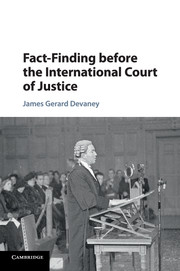Book contents
- Frontmatter
- Contents
- Table of cases
- Acknowledgements
- Introduction
- 1 Rules of evidence before the International Court of Justice
- 2 Criticisms of the Court's current reactive approach to fact-finding
- 3 The practice of other international courts and tribunals
- 4 Winds of change: the possibility of reform
- 5 A more proactive approach to fact-finding
- Epilogue
- Bibliography
- Index
5 - A more proactive approach to fact-finding
Published online by Cambridge University Press: 05 September 2016
- Frontmatter
- Contents
- Table of cases
- Acknowledgements
- Introduction
- 1 Rules of evidence before the International Court of Justice
- 2 Criticisms of the Court's current reactive approach to fact-finding
- 3 The practice of other international courts and tribunals
- 4 Winds of change: the possibility of reform
- 5 A more proactive approach to fact-finding
- Epilogue
- Bibliography
- Index
Summary
Introduction
In assessing the relative merits of a more proactive approach to fact-finding, this final chapter shows that whilst the Court's current approach is not without its advantages, the criticisms of this approach explored in detail in Chapter 2 are justified. As such, the chapter then moves on to consider a more proactive approach to fact-finding. In doing so, Chapter 5 first illustrates in practical terms what the more proactive approach set out in Chapter 4 would look like. Whilst a case was made for such reforms in the preceding chapter, Chapter 5 considers the limitations of the Court's fact-finding powers that have been advocated and ruminates on the merits of the Court's current reactive approach to fact-finding. Having considered the limitations of the Court's fact-finding powers, it is clear that taking a more proactive approach to fact-finding is no panacea for the current problems that the Court faces. Nevertheless, it is maintained that implementing the proposals set out in Chapter 4 would ultimately leave the Court better placed to make accurate factual determinations upon which the law could be decided.
Positive aspects of the Court's current reactive approach
At this point it should be reiterated that at no stage has it been argued that the Court has ever unjustifiably taken a position whereby it has avoided focusing on factual issues in favour of solely addressing the law. As stated above, if one has not been in the Court's position it is often difficult to imagine how one could prove that a decision taken by the Court to focus on legal issues and not conduct further fact-finding was the wrong decision. It may be that the Court had sound reasons for not conducting its own fact-finding, such as considerations of judicial economy or the fact that resolution of those factual issues was not central to the resolution of the dispute at hand. Rather, it was argued that instead of talking in terms of the Court using ‘avoidance techniques’ in order to negate the need to engage with the facts, the most that can be said is that the Court has very clearly displayed a number of tendencies which, taken together, demonstrate a consistently reactive approach to the facts in cases that have come before it.
- Type
- Chapter
- Information
- Fact-Finding before the International Court of Justice , pp. 242 - 253Publisher: Cambridge University PressPrint publication year: 2016

